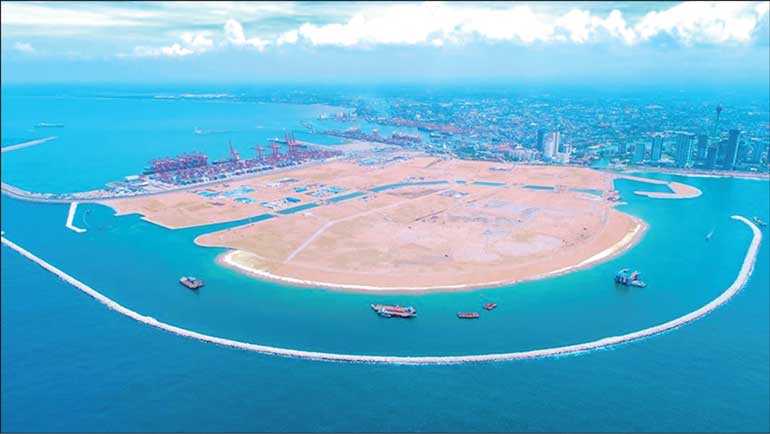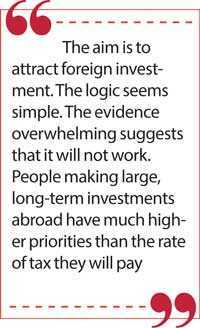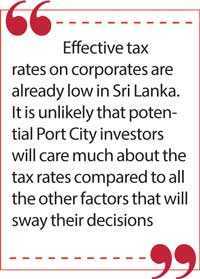Friday Feb 20, 2026
Friday Feb 20, 2026
Monday, 5 April 2021 00:00 - - {{hitsCtrl.values.hits}}

Offering tax exemptions is unlikely to accelerate the progress of Port City
The national sovereignty of Sri Lanka is becoming increasingly severely compromised by the poverty of its Government; the proposed tax exemptions for Port City will make it even poorer
 The Port City is perhaps the most ambitious and exciting development initiative ever undertaken in Sri Lanka. It is vital that it should be a success. It is also important that, now that the groundwork has been completed, the task of building should not be long delayed.
The Port City is perhaps the most ambitious and exciting development initiative ever undertaken in Sri Lanka. It is vital that it should be a success. It is also important that, now that the groundwork has been completed, the task of building should not be long delayed.
For that reason, the Government is soon to bring the Colombo Port City Economic Commission Bill before Parliament. However, the draft tax provisions need more scrutiny. There are two problems. One is that the generous tax exemptions on offer will likely have little or no positive effect in attracting foreign investment. The other is that they threaten national sovereignty.
Tax exemptions are vastly overrated
The Port City Economic Commission will be empowered to exempt businesses from income tax, value added tax, excise tax, debit tax, customs duties, ports and airport levy, and Sri Lanka Export Development Act levies. Incentives already given under the Strategic Development Act will automatically be deemed to have been given to investors by the Commission. The aim is to attract foreign investment.
The logic seems simple. The evidence overwhelming suggests that it will not work. There has been extensive research, over many years, covering many countries, in the effectiveness of tax exemptions in attracting foreign investment – and indeed investment of any type. The primary reason that they do not have much effect is also very simple: people making large, long term investments abroad have much higher priorities than the rate of tax they will pay. Indeed, they are typically much more concerned that the tax burden should be predictable than it should be low.
Here are the other priorities that were listed as more important in a study done by the United Nations Industrial Development Organisation (UNIDO) in 2010, starting from the highest: economic stability; political stability; costs of raw materials; local markets; transparency of legal framework; availability of skilled labour; labour costs; quality of life for expatriate staff; availability of local suppliers; and bilateral agreements and treaties. In other studies, factors like the quality of the electricity, broadband and transport infrastructure, or policing and crime levels, also turn out to be important. These are not isolated studies.
The accumulated wisdom was distilled in a joint effort by the OECD, UN, World Bank and IMF in 2015: https://www.oecd.org/tax/options-for-low-income-countries-effective-and-efficient-use-of-tax-incentives-for-investment.htm. Subsequent research has only confirmed those conclusions.
Note that many of the factors that are important to foreign investment decisions are under the control of governments – provided they have money. Spending money on improving education, technical training, the roads and the legal system could be better routes to attracting foreign investors than offering to free them of taxes. Potential investors will of course ask for tax exemptions. Who would not? It costs nothing to ask, or indeed to talk about investing instead in another country if the exemptions are not offered. But those are just bargaining tactics to get the best deal possible.
 Financial services hubs grow gradually
Financial services hubs grow gradually
Tax exemptions for foreign investors sometimes do make a marginal difference to the investment decision. Why are they unlikely to do so in Port City today? One reason is that effective tax rates on corporates are already low in Sri Lanka. There are many exemptions, especially for VAT. And while the standard rate for corporate income tax is 28%, many small and medium companies are required to pay only 14%. It is unlikely that potential Port City investors will care much about the tax rates compared to all the other factors that will sway their decisions.
There is however a broader question. Port City is intended, among other things, to become a financial services hub. That is an ambitious target. Dozens of governments in the world talk of doing the same thing, but success is rare.
A successful financial services hub requires two things that cannot be easily or quickly achieved. One is density: a cluster of companies operating within the same niche area of financial services, to generate synergies. The other is probity: a reputation for high quality, honest regulation, supported by a competent and efficient judicial system. Without that, the only money that is entrusted is likely to be of very doubtful provenance, and highly mobile. Financial services hubs are built up very slowly. It took decades to build up Singapore, Hong Kong and Dubai.
Port City can become a massive tax leak
Offering tax exemptions is unlikely to accelerate the progress of Port City. But the offer is likely to exacerbate the bigger problem: the national sovereignty of Sri Lanka is becoming increasingly severely compromised by the poverty of its Government. The proposed tax exemptions for Port City will make it even poorer. They will impoverish the Government through three separate mechanisms:
The Government will lose some revenue by giving tax exemptions to Port City investors.
It will lose further revenue if Parliament agrees to the proposal that, for the first five years, investors could benefit from Port City tax and other benefits on activities undertaken anywhere in the country, subject to the agreement of the President or the minister-in-charge. Manufacture brushes in Mawathagama, but pay Port City taxes, i.e. none – no income tax, no value added tax, no excise tax, no debit tax, and no customs duties.
Even after five years, there would be little to prevent any company operating in the island from establishing a (shell) affiliated company in Port City and transferring all of its taxable profits to that company. Imagine a company making cement blocks in Padukka. It formally markets all its product through the affiliate in Port City, at a price that ensures that no taxable profit accrues to the Padukka plant.
In other words, the Colombo Port City Economic Commission Bill threatens almost to put an end to corporate income tax in Sri Lanka, and nibble away further at other sources of Government revenue. Why is this a threat to national sovereignty?
 Governments without tax revenue cannot protect national sovereignty
Governments without tax revenue cannot protect national sovereignty
The term ‘national sovereignty’ has a range of meanings in law and philosophy. From the practical perspective, the essence is the actual capacity of governments to take decisions independently, without being bullied, pressured or coerced by other agents, whether they be other governments, international organisations, big banks or transnational companies. And this is where tax revenue comes into the picture.
A poor man has little choice about what he eats, where he lives, or who is permitted to order him around or insult him. The same principles apply to poor governments. A government that has little income has limited choice about which foreign government or investor is allowed to exploit a prime natural resource, like the site for a new container terminal. A government that is able to commit some of its own money to buy an equity share is in a better position to strike a good deal and ensure that foreign partners adhere to it.
Similarly, if the government is not raising and spending enough money to create a skilled labour force, it has much less capacity to attract the high-tech foreign investors that it wants and needs, and is more likely to have to settle for second or third class alternatives – companies who promise much more than they deliver, use the country for their temporary convenience, and disappear as soon as they see a better opportunity elsewhere.
A government that has money in its account and a good tax system that will reliably generate future revenues can shop around and borrow cheaply. If strapped for cash, it will have to choose between a really expensive loan or the IMF.
This matters because the Government of Sri Lanka is now very much an outlier in the world in terms of the amount of revenue it raises. This is now less than 12% of GDP, and declining. For comparison, the typical figure for a middle-income country like Sri Lanka currently is around 25% of GDP.
Further, during the period between Independence and around 1990, when Sri Lanka was widely lauded for the quality of health and education, governments raised 20-21% of GDP in tax almost every year, even during times of great economic hardship. I would not go so far as to suggest that national sovereignty is the same as national security. But the two are connected, partly by government revenue.
A government that does not raise enough revenue to educate its citizens for modern jobs or protect them against the next pandemic, tsunami, drought or flood cannot be said to be taking national security seriously.
(The writer is Senior Fellow, International Centre for Tax and Development.)